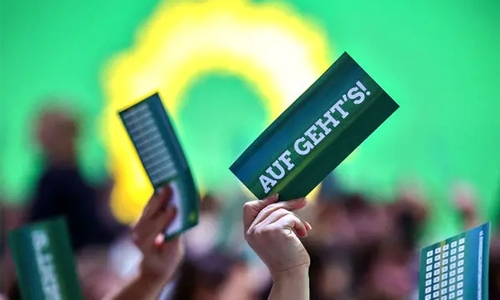Germany’s new political divide has become clear
They call Bavaria the Texas of Germany, and not only for its beautiful countryside and roaring economy. Like Texas, Bavaria has been historically divided politically, with traditionally minded conservatives in its small towns and liberals and progressives in its cities. That is, until state elections last year. The centre-right Christian Social Union held onto power, though its grip slipped, while the centre-left Social Democrats were nearly wiped out in Bavaria’s cities.
The Social Democrats have weakened everywhere lately, so their catastrophic showing in Bavaria wasn’t a surprise. The shock was who replaced them: the Greens. The rise of the Greens — they have a nearly 20 per cent support in recent polls, close to a record high — is not unique among the country’s smaller parties. After being barred from the Bundestag in 2013 because they didn’t reach the 5pc threshold of support, the Free Democrats, a pro-business, libertarian-minded party, have rapidly regained voters under their dynamic 40-year-old leader, Christian Lindner.
While the Free Democrats are less popular than the Greens — they get about 10pc in most polls — their parallel rise over the last few years, coming alongside significant drops in support for historically dominant parties, points to the possibility of a wholesale realignment of German politics. In the second half of the 20th century, the great fault line in German politics ran between the conservative Christian Democrats (and their Bavarian sister party, the Christian Social Union) and the liberal Social Democrats. The right was generally against government spending, except on the military, and held “traditional” values on abortion and marriage; the left supported a more beneficent welfare state and a more open German culture.
Above all, they divided on class: the middle class on the right, the workers on the left. That all changed in the 21st century. The new divide is between two groups that the British author David Goodheart terms “anywheres” and “somewheres.” The anywheres are the highly educated, urban and socially liberal; the somewheres live in the countryside, have a lower level of education and hold more traditional notions of family and society. The growing popularity of the Greens bears witness to this trend.
The party’s core theme remains ecological, but it is increasingly taking stands on social matters such as immigration and gay marriage, which are primarily of interest to “anywheres.” They reject both the class-centric politics of the Social Democrats, as well as the traditional-value-minded Christian Democrats. That’s why the Christian Democrats managed to hold on in rural parts of Bavaria, even as the Social Democrats were wiped out.
A similar story has played out in neighbouring Baden-Württemberg, where a Green politician, Winfried Kretschmann, has been in charge since 2011. But the Greens’ main competitor is not the Christian Democrats nor the Social Democrats, but the Free Democrats — known, informally, as the Liberals. Both the Greens and the Liberals agree on many of the cultural issues that divided the old left and right, like abortion and gay rights. But they divide over contemporary flash points like technology (the Liberals embrace its growing role in society; the Greens are skeptical), immigration (the Liberals support a Canadian-style, rulesbased system; the Greens are for much more open borders) and economics (in this regard, they mimic their predecessors).
This, then, is the new centre of gravity in mainstream German politics. The Christian Democrats and the Social Democrats still exist, of course. But they have become obsolete by convergence. They are ruling together for their third term. Their kinship is one result of the changing axis of values in politics — most German voters, across the political spectrum, now agree on the things that once divided them, and their leading parties. But they have very little new to say about the new difficulties confronting Germany — above all climate change. How should a country that has become a export powerhouse thanks in part to its fast cars position itself in a world being destroyed by the carbon-based economy? How should Germany, arguably the last industrial nation in Europe, regard its vast appetite for energy?
The Greens, needless to say, want to more ecologically minded national policies, regardless of the economic costs. But the Liberals, being pro-business and pro-growth, reject the Greens’ demands as ideological, even unscientific, and in the end self-defeating. Like technology, the environment will only grow in its importance as a focus of policymaking and debate — a fact that only the Greens and Liberals, for now, seem to grasp. Germany is not alone in this political realignment. Across the West, the baby boomers, who followed their predecessors in organising around the old leftright axis, are fading, as are their political values.
The new divides are open society versus closed society, empathy versus resentment, multilateralism versus isolation, parochialism versus cosmopolitanism. The Greens and Liberals are competing for votes among the anywheres, while the much-diminished Christian Democrats, and to their right the populist-nationalist Alternative for Germany party, will chase after the somewheres. It will be tempting for the Greens and Liberals to join forces, especially as they grow to the point where their combined support constitutes a majority.
But that would be bad. One of the reasons given for the rise of the far right in Germany is the coziness between the two leading parties of the 20th century. The two leading parties of the 21st century must not make the same mistake.
Related Posts

